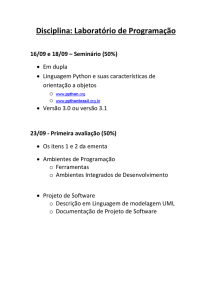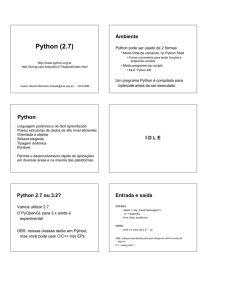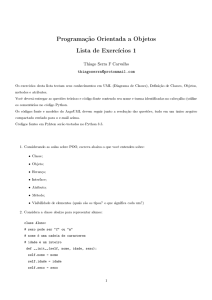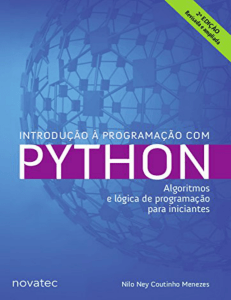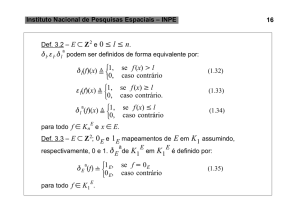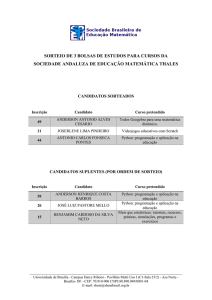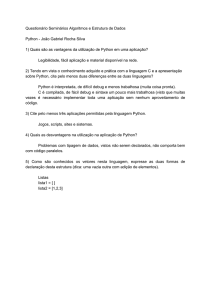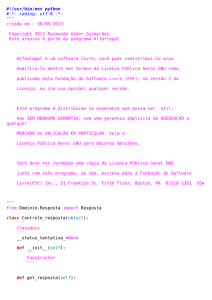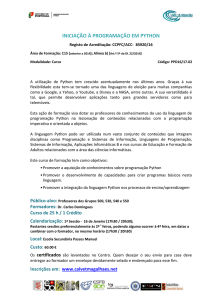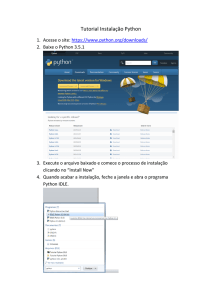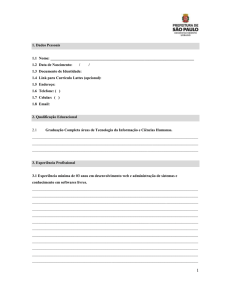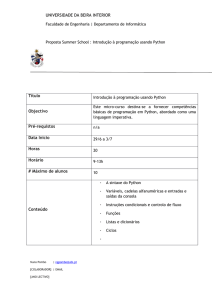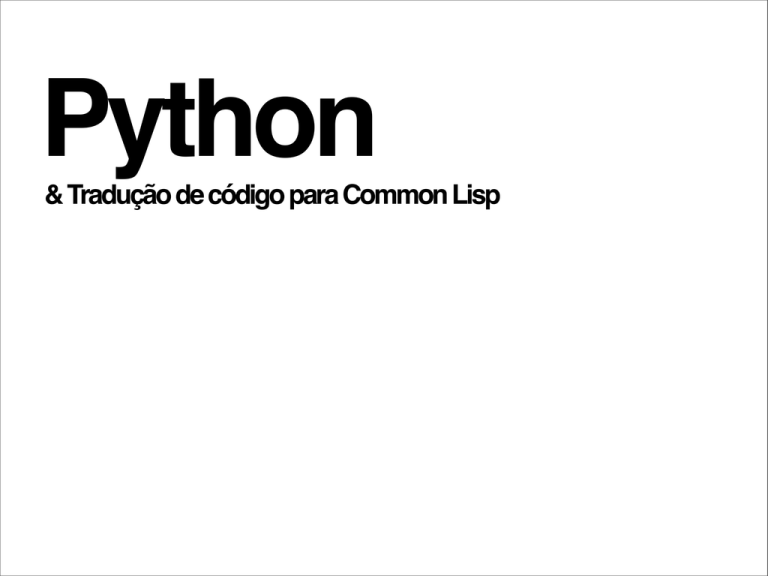
Python
& Tradução de código para Common Lisp
Python
& Tradução de código para Common Lisp
Introdução ao Python
Object Oriented em Python
pnil
Maiores Problemas em traduzir Python para Common Lisp
Ducktype
Yield & With
Visitors & Dispatching
Decorators
Alteração de métodos
Python
Introdução
multi-paradigm: object-oriented, imperative, functional
strong, dynamic, duck
ABC, ALGOL 68,C, Haskell, Icon, Lisp, Modula-3, Perl, Java
CPython, Jython, IronPython, PyPy
Python
Curso Rapido de Python
def fact(n):
...if(n == 0):
......return 1
...else:
......return n * fib(n - 1)
>>>
...
>>>
64
>>>
>>>
>>>
>>>
64
def f (x): return x**2
print f(8)
g = lambda x: x**2
print g(8)
from xml.dom import minidom
import sys, time, urllib, simplejson
topic = sys.argv[1]
url = "http://search.twitter.com/search.json?q=%s&rpp=100" % topic
results = []
page = 1
nextpage = True
try:
while nextpage:
print "Page %d: %s" % (page,url)
json = urllib.urlopen(url)
doc = simplejson.load(json)
nextpage = doc["next_page"]
url = "http://search.twitter.com/search.json" + nextpage
page = page + 1
results.extend(doc["results"])
except KeyError:
print "Got %d Results!" % len(results)
for result in results:
#for it in 0..len(results):
#result = results[it]
print "%s : %s" % (result['from_user'],result['text'])
Python
Integer
Bignum
Float
Complex
String
Symbol
Hashtable/Dictionary
Function
Class
Instance
Stream
Boolean
Empty Sequence
Missing Value
42
1E+17
Common Lisp
42
p
1E+17
1,234
1,234
1 + 2J
#C(1, 2)
"hello" or 'hello'
"hello"
'hello'
hello
{}
(make-hash-table)
lambda x: x + x
(lambda (x) (+ x x))
class Stack: ...
(defclass stack ...)
Stack()
(make-instance 'stack)
open("file")
(open "file")
True, False
t, nil
(), [] tuple, array
(), #()
None
nil
Lisp List (linked)
(1, (2.0, ("three",
None)))
(1 2.0 "three")
Python List (adjustable array)
[1, 2.0, "three"]
(make-array
3 :adjustable t ...
Python
Object Oriented
class Queue(object):
def __init__(self):
self.__object = []
def push(self,obj):
self.__object.push(obj)
def pop(self.obj):
return self.__object.pop()
a = Queue()
a.push(1)
print a.pop()
foo.meth(arg) == C.meth(foo, arg)
pnil
pnil
Maiores Problemas
Inner Classes
Duck typing
Semantica não presente em Common Lisp (yield, with)
pnil
Inner Classes
Em Python é possível definir classes dentro de
classes (e até de funções/métodos).
Em Common Lisp nem os métodos pertencem ás
classes.
Python
Duck Typing
“Pythonic programming style that determines an object's type by inspection of its method or
attribute signature rather than by explicit relationship to some type object ("If it looks like a duck
and quacks like a duck, it must be a duck.") By emphasizing interfaces rather than specific types,
well-designed code improves its flexibility by allowing polymorphic substitution. Duck-typing
avoids tests using type() or isinstance(). Instead, it typically employs the EAFP (Easier to Ask
Forgiveness than Permission) style of programming.”
if hasattr(mallard, "quack"):
...
try:
mallard.quack()
except (AttributeError, TypeError):
print >> sys.stderr "mallard can't quack()")
Python
Duck Typing
def foo (a,b):
return a % b
>>> foo (1,2)
1
>>> foo (“hello %d!”, “jenny”)
'hello jenny!'
Python
Duck Typing
(shadow ‘mod)
(defgeneric mod (a
(defmethod mod ((a
(cl:mod a b))
(defmethod mod ((a
(cl:format nil
b))
integer) (b integer))
string) (b string))
a b))
CL-USER> (mod 1 2)
1
CL-USER> (mod "hello ~A!" "jenny")
"hello jenny!"
Python
Generators
Principio semelhante às continuações de Scheme:
>>> def foo ():
...
print "a"
...
yield
...
print "b"
...
yield
...
>>>
>>> a = foo()
>>> a.next()
a
>>> a.next()
b
>>> a.next()
Traceback (most recent call last):
File "<stdin>", line 1, in <module>
StopIteration
>>>
Python
Generators
O Common Lisp não possui continuations!
A tradução é bastante difícil...
def fib():
a, b = 0, 1
while 1:
yield b
a, b = b, a+b
... mas possível!
Python
With
with EXPR as VAR:
BLOCK
mgr = (EXPR)
exit = mgr.__exit__
value = mgr.__enter__()
exc = True
try:
try:
VAR = value
BLOCK
except:
exc = False
if not exit(*sys.exc_info()):
raise
finally:
if exc:
exit(None, None, None)
pnil
Internals
1+2
ast = compile(contents,argv[1],"exec",_ast.PyCF_ONLY_AST)
!"#$%&'()*##+,-
Visitor
!"#$%.,/0
!"#$%&''()*
!"#$%.+-1(
!./0)1
!"#$%345
!"#$%2//
+*,&-&%
!"#$%345
(+ 1 2 )
+*,&-&%
pnil
Internals
Visitor
Python não consegue decidir como
despachar a mensagem devido ao duck
typing
Java
Visitor
interface Visitor {
void visit(Wheel wheel);
void visit(Engine engine);
...
}
interface CarElement{
void accept(Visitor visitor);
}
class Wheel implements CarElement{
private String name;
Wheel(String name) {
this.name = name;
}
String getName() {
return this.name;
}
public void accept(Visitor visitor) {
visitor.visit(this);
}
}
class Car {
CarElement[] elements;
public CarElement [] getElements(){
return elements.clone();
}
}
class CarElementPrintVisitor implements
CarElementVisitor {
public void visit(Wheel wheel) {
System.out.println("Visiting "+ wheel.getName
()
+ " wheel");
}
public void visitCar(Car car) {
System.out.println("\nVisiting car");
for(CarElement element : car.getElements()) {
element.accept(this);
}
System.out.println("Visited car");
}
}
Common Lisp
Visitor
(defclass car-element ())
(defgeneric visit (obj))
(defclass wheel (car-element)
((name (:type string
:initarg name
:initform “”
:acessor wheel-name))))
(defmethod visit ((obj wheel))
(format t “I’m visiting a wheel”))
(defclass engine (car-element))
(defmethod visit ((obj car))
(format t “I’m visiting a car”)
(loop for i in car-element do
(visit (car-element obj)))
(defclass car (car-element)
((elements (:type (list car-element)
:initargs ()
:accessor car-element)))
(defmethod visit ((obj engine))
(format t “I’m visiting a engine”))
Python
Visitor
class CarElement (object):
import dispatch
class Wheel (CarElement):
def __init__(name):
self.name = name
class Visitor (object):
@dispatch.on('node')
def visit(self, node):
"Generic Method"
class Engine (CarElement):
class Car (CarElement):
def __init__():
self.elements =[]
@visit.when(Wheel)
def visit(self,node):
print “I’m visiting a Wheel”
@visit.when(Engine)
def visit(self,node):
print “I’m visiting a Engine”
@visit.when(Car)
def visit(self,node):
print “I’m visiting a Car”
for i in node.elements:
visit(node)
Python
Decorators
@classmethod
def foo(cls):
perform method operation
def foo(self):
perform method operation
foo = classmethod(foo)
class PostArticle(RequestHandler):
@require_login
def get(self):
self.render("post.html")
Python
Alterar Métodos em runtime
>>> class FooBar (object):
...
def foo (self):
...
print "Foo!"
...
>>> a = FooBar()
>>> def foo (self):
...
print "Bar!"
...
>>> FooBar.foo = foo
>>> a.foo()
Bar!
>>>
Python 3000
Python 3000
Lançado ontem á noite
Quebra compatibilidade com o Python 2.x
Suporta código escrito em unicode
Alguma alterações relacionadas com o statement print
Fim
Questões?

